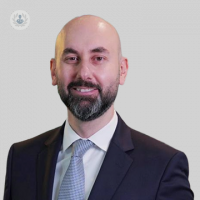An expert's guide to Mohs surgery
Written by:In his latest online article, renowned consultant dermatologist and dermatological surgeon Dr Waseem Bakkour explains Mohs surgery, a highly successful treatment for skin cancer.

What is Mohs surgery?
Mohs surgery, named after its inventor Dr Frederic Mohs, is a highly specialised and precise technique primarily used for treating skin cancers, especially those on the face and other delicate areas. Unlike traditional excision methods, where a predetermined area of skin is removed, Mohs surgery is unique in that it involves a meticulous process of removing thin layers of cancerous tissue and examining them under a microscope immediately. This process is repeated until no cancerous cells remain, ensuring minimal impact on healthy tissue.
Indications for Mohs surgery
Mohs surgery is typically recommended for skin cancers that are large, aggressive or have undefined borders. It is particularly beneficial for treating basal cell carcinomas, squamous cell carcinomas, and other skin tumours that have a high risk of recurrence or are located in cosmetically sensitive or functionally critical areas like the face, ears, or hands.
What should I expect during the procedure?
Before the surgery, the area is cleansed and numbed with local anaesthesia to ensure you remain comfortable throughout the procedure. The surgeon then begins by removing a thin layer of the affected skin. This layer is precisely mapped and examined under a microscope in an on-site lab. If cancer cells are identified at the margins, another layer is removed, and the process continues until the sample shows no remaining cancerous cells.
The procedure duration can vary, and you might be required to wait between stages as the samples are evaluated. However, this meticulous process ensures the complete removal of cancer while preserving healthy tissue.
Post-operative care and recovery
Following Mohs surgery, the wound may be closed with stitches or allowed to heal naturally, depending on the size and depth of the excision. Post-operative care involves keeping the area clean and following specific instructions provided by your surgeon to aid healing and minimise scarring.
What are the benefits of Mohs surgery?
One of the primary advantages of Mohs surgery is its high cure rates, often exceeding 99% for primary skin cancers and around 94% for recurrent skin cancers. Moreover, the precision of this technique minimises the removal of healthy tissue, making it an ideal choice for sensitive areas where preserving cosmetic or functional outcomes is crucial.
In conclusion, Mohs surgery stands as a highly effective and precise treatment option for various types of skin cancer. If you are facing skin cancer, consult with a dermatologist or a Mohs surgeon to determine the most suitable treatment plan for your condition. Understanding these options is vital in making informed decisions about your health and well-being.
If you would like to book a consultation with Dr Waseem Bakkour, you can do so today via his Top Doctors profile.


